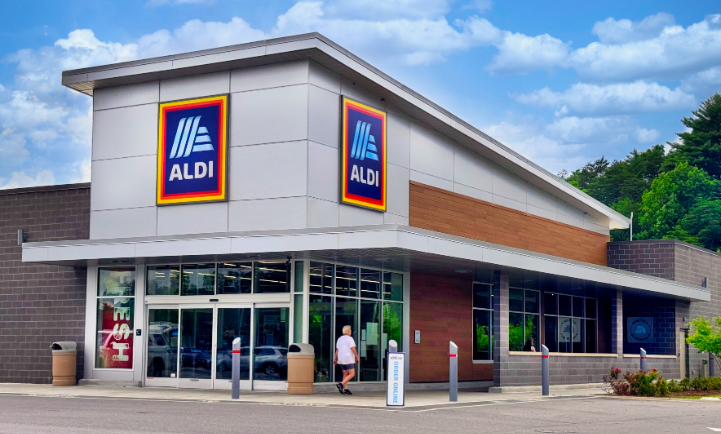
You know that satisfying feeling when you spot the Aldi catalogue in your letterbox, promising another week of bargain groceries and quirky Special Buys? Well, the story behind that familiar four-letter name is far more dramatic than you might imagine—involving wartime heroics, a spectacular kidnapping, and two German brothers whose obsession with saving every last penny built a global empire.
In 1961 the brothers changed the name to ALDI, which is short for Albrecht Discount, but the tale of how Karl and Theo Albrecht transformed their mother's corner shop into Australia's most trusted supermarket chain is anything but simple.
From war zones to grocery aisles
The Albrecht story began in 1913 when Anna Albrecht opened a small grocery store in Essen, Germany. But it was her two sons who would turn this humble family business into something extraordinary—though not before surviving some of the darkest chapters of the 20th century.
Both brothers served in World War II, with Theo conscripted at 18 into the German Army, serving in the North African campaign before being captured by Americans in Tunisia. Karl fought on the brutal Russian front, where he nearly lost his leg.
When they returned home in 1946, they found their mother's shop miraculously still standing despite years of Allied bombing raids.
In 1946, her sons, Karl and Theo Albrecht took over the business with the goal of expanding its operations.
Having witnessed the devastating effects of war and economic collapse, the brothers understood something their competitors didn't—that ordinary people needed access to quality food at prices they could actually afford.
'The best quality at the lowest price'
The art of extreme penny-pinching
What made the Albrecht brothers truly remarkable wasn't just their business acumen, but their almost comical dedication to frugality. These weren't wealthy men playing at being thrifty—even after amassing billions, they lived their principles every single day.
Obsessed with frugality, Theo is said to have collected and used pencil stubs frequently.
He was also known to wear cheap, poorly fitting suits, and preferred plain meals with many potatoes. But perhaps the most famous story involves Theo's reaction to architectural plans for a new Dutch store.
When he was asked to approve the plans for a new store in the Netherlands, he stated that the design was good, but the paper it was drawn on was too thick: 'If you use thinner paper, we will save money'.
Karl was slightly less austere—he famously allowed himself afternoon naps and was such an avid golfer that he decided the best thing to do was to just build his own golf course and hotel. That way, he wasn't paying club or greens fees.
Did you know?
Did you know?
The Albrecht brothers collected antique typewriters as a hobby and grew orchids together. Despite their billions, they had no holiday homes, private jets, or chauffeurs, and Theo drove a modest Mercedes E-Class.
The cigarette dispute that changed everything
By 1960, the brothers had built 300 stores with an annual turnover of millions. But success couldn't prevent a family feud that would reshape the entire business.
In the early 1960s, Theo and Karl had a disagreement over whether or not the stores should sell cigarettes (Karl reportedly believed tobacco products would attract shoplifters).
The solution was remarkably civilised by family business standards. The brothers amicably split the business — Karl led a (cigarette-free) division called ALDI Sud that controlled the stores located in the southern half of Germany, and Theo took the stores in the country's northern half under ALDI Nord.
This split has had lasting consequences that affect shoppers worldwide. In Australia, we shop at ALDI Süd stores (Karl's non-smoking division), while if you've ever enjoyed a bargain at Trader Joe's in America, that's actually owned by Theo's ALDI Nord.
A kidnapping that shook Germany
The brothers' commitment to privacy intensified dramatically after a shocking incident in 1971. In 1971, Albrecht was kidnapped. A ransom of seven million German marks (approximately US$2 million at the time) was paid for his release. He was held at gunpoint by Heinz-Joachim Ollenburg, a lawyer, and his accomplice Paul Kron.
Theo was held in a cupboard for 17 harrowing days before the ransom was delivered by the Bishop of Essen. His kidnappers were eventually caught by authorities, but only half of the money was recovered.
True to his penny-pinching nature, Albrecht later unsuccessfully claimed the ransom as a tax deductible business expense in court. After his release, Albrecht would travel to work in an armoured car after the incident, using a different route every day.
ALDI Australia milestones
2001: First stores open at Bankstown Airport and Marrickville on January 25
2003: First Melbourne stores open at West Heidelberg and Chirnside Park
2004: 54 stores across eastern states
2017: Claims 10 per cent of Australian grocery market
2018: Named Australia's most trusted brand
2021: Powered by 100 per cent renewable electricity
2024: Over 570 stores across 6 states and territories
Winning over Australia
When the German-based supermarket chain arrived in Australia without too much fanfare when it opened two stores in Sydney, on January 25, 2001, few could have predicted how thoroughly it would transform Australian grocery shopping.
The arrival was perfectly timed. In Australia, ALDI's launch coincided with the demise of the grocery discounter Franklins, leaving a gap in the market for budget-conscious shoppers. Initially, the stores did not advertise and relied on word-of-mouth to gain traction in the market. Instead of a wide range of national brands, the chain focused on home brands and low prices.
The strategy worked brilliantly. In July 2018 Roy Morgan research revealed ALDI as Australia's most trusted brand, despite its German ownership. Today, Aldi had approximately 11 percent share of the Australian grocery market in 2018, and since opening in 2001, ALDI has contributed an estimated $30 billion to Australia's gross domestic product.
The family feud continues
The Albrecht legacy of frugality remains contentious even today. When Theo's widow Cäcilie died in 2018, her will sparked fresh family drama. The so-called ALDI 'grande dame' Cäcilie Albrecht settled a score with the five children of her late son and his widow Babette, accusing them of lavish spending that was out of line with the company's frugal philosophy. Cäcilie excluded her son's children and her daughter-in-law from any future roles in the firm.
The dispute highlights how deeply ingrained the brothers' penny-pinching philosophy became in the family DNA. As one former manager observed: 'It's totally natural that the younger generation would react against the excessive thriftiness. The parsimony was so extreme, it was unsustainable'.
The Albrecht brothers' business principles that built ALDI
- Every business expense must ultimately be charged back to customers
- Focus on a small selection of high-quality products rather than endless choice
- No advertising—let word-of-mouth and low prices do the talking
- Keep stores small, simple, and efficient
- Private label products to control costs and quality
- Make customers part of the cost-saving process (BYO bags, return trolleys)
What this means for your weekly shop
The brothers' obsessive cost-cutting wasn't just quirky behaviour—it created a shopping experience that continues to deliver genuine value to Australian families. More Australians are filling their trolleys at ALDI and sharing $3.1 billion in annual savings according to the company's latest data.
That savings comes from the same principles Theo and Karl established decades ago: limited product ranges mean better buying power, simple store layouts reduce overhead costs, and that famous coin-deposit trolley system? It eliminates the need for staff to collect trolleys from car parks.
Even the Special Buys that arrive each Wednesday and Saturday follow the brothers' original model of quickly moving products that don't sell—except now it's snow gear in July and garden furniture in February, rather than just removing slow-moving groceries from shelves.
The next time you're wheeling your trolley through those familiar wide aisles, remember that you're experiencing the legacy of two remarkable brothers who proved that extreme frugality, when applied with genuine care for customers, can build something truly extraordinary. From pencil stubs to billion-dollar empires—that's the unlikely story behind those four simple letters above the door.
What's your favourite ALDI find, whether from the regular range or those irresistible Special Buys? Share your bargain hunting stories in the comments below!
Primary Source
https://www.dailymail.co.uk/yourmon...tml?ns_mchannel=rss&ns_campaign=1490&ito=1490
How Aldi's frugal, reclusive founders turned a corner grocery store into a $38 billion fortune
Cited text: In 1961 the brothers changed the name to Aldi, which is short for Albrecht Discount, and the business continued to grow.
Excerpt: In 1961 the brothers changed the name to Aldi, which is short for Albrecht Discount
https://www.cnbc.com/2019/05/14/how...-local-grocery-into-a-38-billion-fortune.html
Strategy Study: How Aldi Became A Global Supermarket Giant
Cited text: In 1913, Anna Albrecht opened a small grocery store in Essen, Germany.
Excerpt: Anna Albrecht opened a small grocery store in Essen, Germany
https://www.cascade.app/studies/aldi-strategy-study
Theo Albrecht—Wikipedia
Cited text: In 1940, at the age of 18, Theo was conscripted into the German Army and served in the North African campaign. Theo was captured by Americans in Tunis...
Excerpt: Theo conscripted at 18 into the German Army, serving in the North African campaign before being captured by Americans in Tunisia
https://en.wikipedia.org/wiki/Theo_Albrecht
Strategy Study: How Aldi Became A Global Supermarket Giant
Cited text: In 1946, her sons, Karl and Theo Albrecht took over the business with the goal of expanding its operations.
Excerpt: In 1946, her sons, Karl and Theo Albrecht took over the business with the goal of expanding its operations
https://www.cascade.app/studies/aldi-strategy-study
Theo Albrecht—Wikipedia
Cited text: Obsessed with frugality, Theo is said to have collected and used pencil stubs frequently. He was also known to wear cheap, poorly fitting suits, and p...
Excerpt: Obsessed with frugality, Theo is said to have collected and used pencil stubs frequently.
https://en.wikipedia.org/wiki/Theo_Albrecht
Theo Albrecht | Military Wiki | Fandom
Cited text: [10] When he was asked to approve the plans for a new store in the Netherlands, he stated that the design was good, but the paper it was drawn on was ...
Excerpt: When he was asked to approve the plans for a new store in the Netherlands, he stated that the design was good, but the paper it was drawn on was too thick: 'If you use thinner paper, we will save money'
https://military-history.fandom.com/wiki/Theo_Albrecht
The Untold Truth Of The Brothers Who Started Aldi—Mashed
Cited text: Karl, for instance, was such an avid golfer that he decided the best thing to do was to just build his own golf course and hotel. That way, he wasn't ...
Excerpt: was such an avid golfer that he decided the best thing to do was to just build his own golf course and hotel.
https://www.mashed.com/171899/the-untold-truth-of-the-brothers-who-started-aldi/
The remarkable rise of Aldi, and the turbulent family story at its core | lovemoney.com
Cited text: By 1960, Theo and Karl Albrecht owned 300 stores with an annual turnover of millions.
Excerpt: 300 stores with an annual turnover of millions
https://www.lovemoney.com/galleryli...di-and-the-turbulent-family-story-at-its-core
How Aldi's frugal, reclusive founders turned a corner grocery store into a $38 billion fortune
Cited text: In the early 1960s, Theo and Karl had a disagreement over whether or not the stores should sell cigarettes (Karl reportedly believed tobacco products ...
Excerpt: In the early 1960s, Theo and Karl had a disagreement over whether or not the stores should sell cigarettes (Karl reportedly believed tobacco products would attract shoplifters)
https://www.cnbc.com/2019/05/14/how...-local-grocery-into-a-38-billion-fortune.html
How Aldi's frugal, reclusive founders turned a corner grocery store into a $38 billion fortune
Cited text: As a result, the brothers amicably split the business — Karl led a (cigarette-free) division called Aldi Sud that controlled the stores located in the...
Excerpt: The brothers amicably split the business — Karl led a (cigarette-free) division called Aldi Sud that controlled the stores located in the southern half of Germany, and Theo took the stores in the country's northern half under Aldi Nord
https://www.cnbc.com/2019/05/14/how...-local-grocery-into-a-38-billion-fortune.html
Theo Albrecht—Wikipedia
Cited text: In 1971, Albrecht was kidnapped. A ransom of seven million German marks (approximately US$2 million at the time) was paid for his release. He was held...
Excerpt: In 1971, Albrecht was kidnapped. A ransom of seven million German marks (approximately US$2 million at the time) was paid for his release.
https://en.wikipedia.org/wiki/Theo_Albrecht
Theo Albrecht—Wikipedia
Cited text: His kidnappers were eventually caught by authorities, but only half of the money was recovered.
Excerpt: His kidnappers were eventually caught by authorities, but only half of the money was recovered
https://en.wikipedia.org/wiki/Theo_Albrecht
Theo Albrecht—Wikipedia
Cited text: Albrecht later unsuccessfully claimed the ransom as a tax deductible business expense in court.
Excerpt: Albrecht later unsuccessfully claimed the ransom as a tax deductible business expense in court
https://en.wikipedia.org/wiki/Theo_Albrecht
The family behind grocery giant Aldi is locked in a feud after the founder's wife tried to cut her grandkids out of the business in her will — meet the Albrechts
Cited text: Albrecht would travel to work in an armored car after the incident, using a different route every day.
Excerpt: Albrecht would travel to work in an armoured car after the incident, using a different route every day
https://www.businessinsider.nl/albr...ecretive-lifestyle-photos-2019-3/?jwsource=cl
Aldi supermarkets mark 20 years in Australia | The Canberra Times | Canberra, ACT
Cited text: The German-based supermarket chain arrived in Australia without too much fanfare when it opened two stores in Sydney, on January 25, 2001.
Excerpt: the German-based supermarket chain arrived in Australia without too much fanfare when it opened two stores in Sydney, on January 25, 2001
https://www.canberratimes.com.au/story/7352637/twenty-years-of-aldi-how-did-we-live-without-it/
Australian food history timeline—Aldi arrives in Australia
Cited text: In Australia, Aldi’s launch coincided with the demise of the grocery discounter Franklins.
Excerpt: In Australia, Aldi's launch coincided with the demise of the grocery discounter Franklins
https://australianfoodtimeline.com.au/aldi-in-australia/
Australian food history timeline—Aldi arrives in Australia
Cited text: Initially, the stores did not advertise and relied on word-of-mouth to gain traction in the market. Instead of a wide range of national brands, the ch...
Excerpt: Initially, the stores did not advertise and relied on word-of-mouth to gain traction in the market.
https://australianfoodtimeline.com.au/aldi-in-australia/
Australian food history timeline—Aldi arrives in Australia
Cited text: In July 2018 Roy Morgan research revealed Aldi as Australia’s most trusted brand, despite its German ownership.
Excerpt: In July 2018 Roy Morgan research revealed Aldi as Australia's most trusted brand, despite its German ownership
https://australianfoodtimeline.com.au/aldi-in-australia/
Aldi—Wikipedia
Cited text: Aldi had approximately 11 percent share of the Australian grocery market in 2018.
Excerpt: Aldi had approximately 11 percent share of the Australian grocery market in 2018
https://en.wikipedia.org/wiki/Aldi
About ALDI—ALDI Australia
Cited text: Since opening in 2001, ALDI has contributed an estimated $30 billion to Australias gross domestic product.
Excerpt: since opening in 2001, ALDI has contributed an estimated $30 billion to Australia's gross domestic product
https://corporate.aldi.com.au/about-aldi/
The remarkable rise of Aldi, and the turbulent family story at its core | lovemoney.com
Cited text: The so-called Aldi 'grande dame' Cäcilie Albrecht settled a score with the five children of her late son and his widow Babette (pictured), accusing th...
Excerpt: The so-called Aldi 'grande dame' Cäcilie Albrecht settled a score with the five children of her late son and his widow Babette, accusing them of lavish spending that was out of line with the company's frugal philosophy.
https://www.lovemoney.com/galleryli...di-and-the-turbulent-family-story-at-its-core
The frugality feud tearing apart the Aldi family | The New Daily
Cited text: “It’s totally natural that the younger generation would react against the excessive thriftiness,” said Eberhard Fedtke, a former Aldi Nord manager and...
Excerpt: 'It's totally natural that the younger generation would react against the excessive thriftiness.
https://www.thenewdaily.com.au/life/relationships/2016/09/09/aldi-family-dispute
Small family owned business to a major international brand | ALDI news and blogs
Cited text: More Australians are filling their trolleys at ALDI and sharing $3.1 billion in annual savings.Grocery shopping data released today by ALDI Australia ...
Excerpt: More Australians are filling their trolleys at ALDI and sharing $3.1 billion in annual savings
https://www.aldicareers.com.au/arti...owned-business-to-a-major-international-brand







